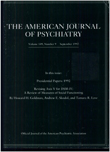Cognitive and behavioral effects of the coadministration of dextroamphetamine and haloperidol in schizophrenia
Abstract
OBJECTIVE: The authors sought to determine if an acute dose of dextroamphetamine might have positive effects on affect and cognition in schizophrenic patients maintained on a regimen of haloperidol and, if so, what variables might predict such improvements. METHOD: Twenty- one patients with chronic schizophrenia who were hospitalized on a research ward received a single oral dose of dextroamphetamine (0.25 mg/kg) in a double-blind, placebo-controlled, crossover study. All patients were receiving 0.4 mg/kg per day of haloperidol. Cognitive tests, motor tests, global ratings, mood ratings, and videotape ratings were used to determine the effect of the coadministration of these drugs. Ventricle-brain ratios derived from CT scans were used to predict response to the coadministration of these drugs. RESULTS: Amphetamine improved performance on a measure of concept formation on the Wisconsin Card Sorting Test but did not result in changes in performance on tests of memory or attention. As a group, the patients were more active and performed psychomotor tests more quickly while receiving amphetamine. Six patients were judged by clinical raters to have improved in terms of affect, cooperation, and engagement with the environment. Improvement was associated with enlarged cerebral ventricles and increases in blink rate from the placebo to the active drug condition. No patient unequivocally worsened. CONCLUSIONS: These results may be consistent with the theory that coadministration of amphetamine and haloperidol produces relatively selective enhancement of cortical dopaminergic activity. However, because of the acute nature of the trial and the specialized research environment in which it was conducted, the authors do not advocate amphetamine as a routine clinical treatment of schizophrenia.
Access content
To read the fulltext, please use one of the options below to sign in or purchase access.- Personal login
- Institutional Login
- Sign in via OpenAthens
- Register for access
-
Please login/register if you wish to pair your device and check access availability.
Not a subscriber?
PsychiatryOnline subscription options offer access to the DSM-5 library, books, journals, CME, and patient resources. This all-in-one virtual library provides psychiatrists and mental health professionals with key resources for diagnosis, treatment, research, and professional development.
Need more help? PsychiatryOnline Customer Service may be reached by emailing [email protected] or by calling 800-368-5777 (in the U.S.) or 703-907-7322 (outside the U.S.).



